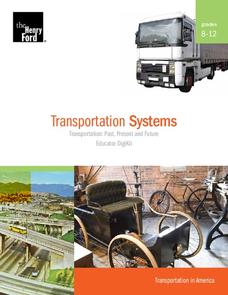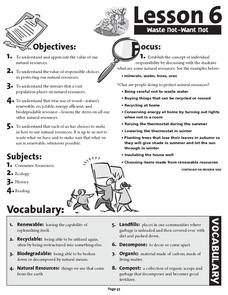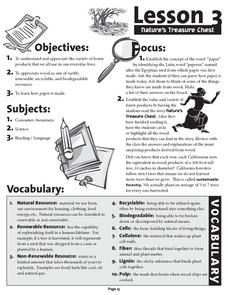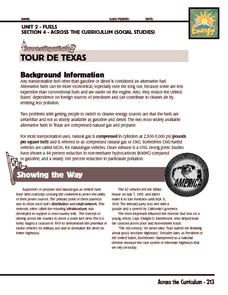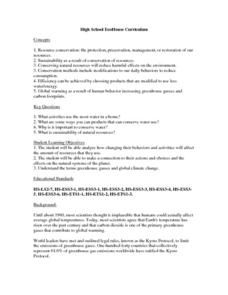Safe Drinking Water Foundation
Water Pollution
An introductory lesson plan to a unit on water pollution, young environmentalists are asked to brainstorm examples of pollutants in water. This lesson plan will help develop a sense of what water pollution is and where the pollutants...
Safe Drinking Water Foundation
Ask an Engineer
A wrap-up to the unit, young environmentalists discuss and write about the difference in perspectives of a water keeper and water treatment engineer.
Earth Day Network
Staying Green While Being Clean
Clean up the environment with a lesson that focuses on replacing hazardous cleaning supplies with green, environmentally-friendly products. Using a dirty patch of surface as a control area, kids clean other parts of various surfaces...
Curated OER
The Chesapeake Bay in Captain John Smith's Time
When Captain John Smith visited the Chesapeake Bay in the summer of 1608, what types of animals and habitats did he encounter? Your young historians will analyze primary source documents to answer this question, as well as compare the...
Government of South Australia
Don't Waste Your Energy
Don't lift another finger, this physical and environmental science unit has everything you need to begin teaching your class about energy. Starting with a look at the greenhouse effect, these lessons and activities take young scientists...
Henry Ford Museum
Transportation Systems
Learners analyze the evolution of cultural attitudes through the lens of transportation, examining several artifacts, documents, and photographs. Topics covered include how American attitudes have influenced society's evolution into a...
Forest Foundation
Forests, Carbon & Our Climate
To conclude their examination of forest ecosystems, class members consider the role forests play in the carbon cycle and how forests can offset climate change.
Forest Foundation
Forest Families
Class groups play a Forest Families card game to reinforce concepts presented in the first six sessions of a nine-lesson study of tress and forest ecosystems.
Forest Foundation
Waste Not - Want Not
Recycling is the focus in the sixth of a nine-instructional activity series devoted to forest ecosystems. Class members read an article about the responsible use of natural resources and ways to reduce land fill.
Forest Foundation
Forest Health
Young foresters examine the strategies, like prescribed burns and thinning, that are employed to ensure healthy forests.
Forest Foundation
The Sustainable Forest
As part of their examination of forest ecosystems, class members examine how foresters, biologists, botanists, geologists, and hydrologists work to together to develop a management plan for sustainable forests.
Forest Foundation
Nature's Treasure Chest
Renewable, recyclable, and biodegradable. As part of their study of the forest ecosystem, class members read "Nature's Treasure Chest" about the many products made from trees and then craft their own recycled paper.
Forest Foundation
The Nature of Trees
Young botanists examine the different parts of tress and then draw parallels between the functions of these parts and the function of parts of the human body.
Forest Foundation
The Web of Life
Producers, herbivores, carnivores, omnivores, decomposers. To begin a study of the forest ecosystem, learners examine the connections among the members of ecological communities.
Wild BC
Climate Change Bingo
Here is a 20-box bingo card to use when exploring ways that humans impact the environment. Various environmentally aware activities are listed in the boxes, and learners circulate the room to find someone who practices the different...
Berkshire Museum
Where’s the Water?: Acting Out Science Cycles
Young scientists transform themselves into rivers, oceans, clouds, and drops of water in order to explore the water cycle. After assigning and explaining to learners their different roles in the activity, the teacher reads aloud a...
Texas State Energy Conservation Office
Investigation: Blowing in the Wind
Using a simulated air sample, environmental or earth science pupils examine the components. You will need to prepare the faux air by using a hole punch and various colors of construction paper. Each color will represent a different...
Texas State Energy Conservation Office
Investigation: Tour de Texas
Teams of Texas tourists gather into groups to analyze what they can do with $50 worth of an alternative fuel. They write checks, keep a balance sheet, and map out their sight-seeing route taking into consideration the location of...
Texas State Energy Conservation Office
Investigation: Making a PV Cell
Rise and shine! Class members collaborate to construct a photovoltaic solar cell with two semiconductor layers, as guided by this fabulous lab sheet. They test its output with an ammeter or galvanometer.
Texas State Energy Conservation Office
Investigation: Gas Laws in Action - Propane
Using helium as an example of propane, physical science middle schoolers experiment with and graph the relationship between temperature and volume in gases. In a whole-class demonstration, they show how molecules behave under different...
Texas State Energy Conservation Office
Investigation: Conservation of Energy
By rolling marbles down a six-foot length of track, physical scientists determine how much energy is lost to heat. It is recommended that you opt for the foam pipe insulation track because more friction slows the marble, allowing...
Texas State Energy Conservation Office
Investigation: Oil Recovery
Energy conservers investigate gravel size to discover if it impacts the amount of oil recovered in the extraction process.
Texas State Energy Conservation Office
Are Your Computers Wasting Energy?
After reading about the amount of energy that is used to power a personal computer, learners take a look at their own computer use and therefore, their energy consumption. They do this through a series of questions and computations on...
Curated OER
High School EcoHouse Curriculum
How has the level of carbon dioxide changed over recent years, and what is contributing it? Groups work together to research and present their findings in a creative way. Also built into the lesson is a visit to a sustainable house, but...







